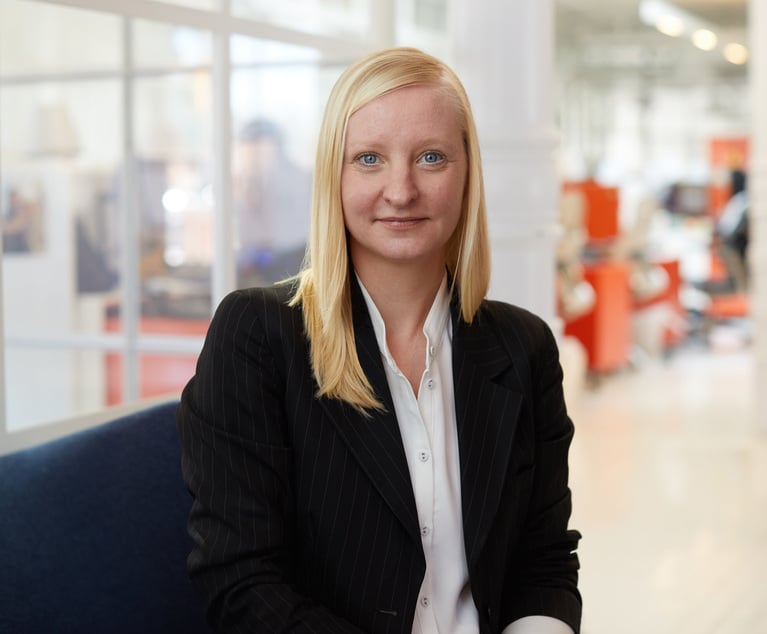Seeing Lawyers in Crisis, Some Blame the Billable Hour
Measuring lawyers by the hours they bill was long treated as a necessary evil. Faced with evidence that mental health erodes as hours increase, legal industry innovators are asking how necessary it really is.
May 19, 2019 at 07:00 PM
8 minute read
 Image: Shutterstock
Image: Shutterstock
Alan Levin hears it all the time in his therapy practice: Lawyers say they're wracked with stress over targets for billable hours. Being short on hours often feels like an affront to their self-worth, says Levin, a former attorney.
 In her meetings with law firm associates seeking advice on how to avoid professional burnout, Paula Davis-Laack asks lawyers what would most to boost their well-being and help them thrive. The most common answer? Escaping the grip of the billable hour.
In her meetings with law firm associates seeking advice on how to avoid professional burnout, Paula Davis-Laack asks lawyers what would most to boost their well-being and help them thrive. The most common answer? Escaping the grip of the billable hour.
“I just hope that firms recognize that when you keep hearing the same message over and over and over again, it is an indicator that maybe new conversations need to start happening,” said Davis-Laack, a former Michael Best & Friedrich associate who is now founder and CEO of the Stress & Resilience Institute.
Big Law innovation evangelists have long offered arguments for ditching the billable hour, from competing with tech-savvy legal industry upstarts and other professional services firms to pleasing efficiency-focused clients.
But with the recognition that so many lawyers are crippled by stress, substance abuse and depression, some are making another argument: Scrapping allegiance to the traditional metric law firms use to judge performance and award compensation can improve attorneys' health and lives.
Today's young lawyers have more career options as the industry's service model has grown to include legal tech companies, alternative legal service providers and the Big Four accounting firms, which are increasingly hiring law school graduates. “Lawyers have more places [to work] and more options,” said Liam Brown, chairman of Elevate Services. “Now, you can have a career around a whole range of [new employers]: Legal consulting, legal operations, or law companies.”
But while those employers don't traditionally adhere to the billable hour, some of them may come with their own stresses, including potentially lower pay, the uncertainty of joining an untested company and the impermanence of paychecks in a “gig economy.” And for the vast majority of lawyers in private practice, the billable hour still rules.
Plenty of research suggests it's a model that is detrimental to lawyers' health.
A 2015 study titled “What Makes Lawyers Happy?” found that psychological predictors of well-being decreased as lawyers were required to bill more hours. Those lawyers with higher billable requirements cited less internal motivation, satisfaction and increased levels of alcohol abuse.
The study said the results were “an apparent example of managers undermining workers' self-determined motivation and well-being by promoting a focus on external rewards. Thus, as billable hours go up, income goes up and happiness goes down.”
A 2013 article in the journal Psychiatry, Psychology and Law found that 37 percent of Australian lawyers surveyed displayed moderate to extremely severe depressive symptoms and 35 percent screened positive for hazardous drinking. Among the survey respondents, lawyers who billed the highest number of hours experienced the worst psychological outcomes.
Global competition has increased the pace of work and law firms' focus on increasing profits has led to a “ratcheting up of billable hours, which has engendered stress and depression,” argues an article published in 2016 in the Griffith Law Review. Indeed, the 1958 American Bar Association pamphlet that is widely credited for introducing the billable hour suggested a 1,300-hours-a-year target. A billable hour more in line with today's expectations, around 2,200 hours, is 70 percent higher.
Colin James, a senior lecturer at the Australian National University who has researched connections between the billable hour and psychological health, concludes in a 2017 paper that the billable hour “may cause anxiety and mental health issues among employed lawyers, and contributes to the loss of good lawyers especially of women from the profession.”
Every year, dozens of mid-level associates tell The American Lawyer in its annual survey that they are displeased with the billable hour requirements.
“It is more stressful to operate in an environment with hours pressure when there are no clear guidelines about how to satisfy the partnership,” one associate said in the 2017 survey.
“I think talented associates who enjoy working in a law firm environment sometimes leave simply because in the long term they are not willing to accept the Big Law lifestyle in terms of hours [and] stress,” another wrote. “Conceivably the firm could do more to retain these kinds of people, but it might require structural changes affecting the economics of the firm and I do not see it happening.”
Quantity vs. Quality
Clifford Chance recently made a step toward that end. The Magic Circle firm announced it would test a year-long pilot program in its Abu Dhabi and Dubai offices that would assess associates on metrics other than the billable hour.
The firm's chief operating officer, Caroline Firstbrook, said in a statement that measuring utilization “has a number of broadly acknowledged limitations,” including that it doesn't measure efficiency, nonbillable work that is beneficial to the firm's strategy and “excellent” client service. Firstbrook did not respond to a message asking if the firm had considered its lawyers well-being as part of the pilot or if it would track metrics related to that.
Critiquing the billable hour is nothing new, of course. In 2002, a group of Clifford Chance associates wrote a memo to the firm's leadership decrying a new requirement that they bill 2,200 hours a year. The memo labeled the requirement “profoundly unrealistic,” “dehumanizing” and “verging on an abdication of our professional responsibilities.”
Clifford Chance's response to the crisis that would be labeled “Paddinggate” was to ensure clients that associates had not been padding their bills to meet hours. But focusing on mental health has become less taboo in the intervening years.
Roger Furey, chair of Katten Muchin Rosenman, is one Big Law leader who sees a new talent model emerging as a result of increasing competition and more attention being paid to associates' desires.
“Some of the younger lawyers want to have a different career path other than grind, grind, grind,” Furey said. “And we can have associates who are not under a requirement to bill 2,200 hours a year. They will be just fine to take that trade-off. We can have happy people, smart lawyers, who we pay less money and we price them out at less.”
In order for that to happen, Furey said clients need to trust that alternative staffing models and billing processes within Big Law firms would not result in lower quality work. Clients sometimes cling to the billable hour out of fear that an alternative fee will be higher than a billable model, Furey said. It is incumbent on law firms to show clients data about how much similar work has traditionally cost, he said.
“There are ways to to get the same work done at a lower cost, but the clients have to trust law firms—or at least some law firms—will get that right without sacrificing quality,” Furey said. “And that's the exciting part. I know we can do it. And I hope we are one of the first firms to do it.”
Tim Batdorf, CEO of legal project management consultancy LegalBizDev, said his company has mostly pitched its services as a way to make legal work more reliable and its cost more predictable. But some law firms have discussed with him the idea that legal project management might be a way to control stress levels for associates. That is because one commonly cited cause of stress for young lawyers is an unreasonable workload, a lack of control over their work and a lack of guidance on how to accomplish it.
“We would take the position that legal project management addresses all of those things,” Batdorf said.
One thing that does not appear to be as motivating as some believe is more money—which is the most explicit reward for working more hours.
The study on lawyer happiness showed that junior partners in law firms reported the same levels of happiness as associates despite making nearly $70,000 more a year. And lawyers in firms with more than 15 attorneys reported significantly lower well-being scores than judges or lawyers in service-oriented positions.
“Simply stated, lawyers appear to be choosing to work in medium and large firms for the wrong reasons in psychological terms,” the study concludes, “and hence their happiness is impaired despite their enhanced income.”
That comes as no surprise to Levin, the lawyer-turned-therapist who now treats his fellow professionals. He said he frequently asks unhappy lawyers if they would be willing to trade 50 to 75 percent of their salary to be working in a setting where colleagues were emotionally supportive and collaborative.
“Every single one of them says, 'Of course. Yes I would,'” Levin said. “Because the quality of our lives as people is far more important than how much money we make.”
This content has been archived. It is available through our partners, LexisNexis® and Bloomberg Law.
To view this content, please continue to their sites.
Not a Lexis Subscriber?
Subscribe Now
Not a Bloomberg Law Subscriber?
Subscribe Now
NOT FOR REPRINT
© 2025 ALM Global, LLC, All Rights Reserved. Request academic re-use from www.copyright.com. All other uses, submit a request to [email protected]. For more information visit Asset & Logo Licensing.
You Might Like
View All
The Week in Data Jan. 21: A Look at Legal Industry Trends by the Numbers

The Right Amount?: Federal Judge Weighs $1.8M Attorney Fee Request with Strip Club's $15K Award

Avoiding the Great Gen AI Wrecking Ball: Ignore AI’s Transformative Power at Your Own Risk
6 minute readTrending Stories
- 1Departing Attorneys Sue Their Former Law Firm
- 2Pa. High Court: Concrete Proof Not Needed to Weigh Grounds for Preliminary Injunction Order
- 3'Something Else Is Coming': DOGE Established, but With Limited Scope
- 4Polsinelli Picks Up Corporate Health Care Partner From Greenberg Traurig in LA
- 5Kirkland Lands in Phila., but Rate Pressure May Limit the High-Flying Firm's Growth Prospects
Who Got The Work
J. Brugh Lower of Gibbons has entered an appearance for industrial equipment supplier Devco Corporation in a pending trademark infringement lawsuit. The suit, accusing the defendant of selling knock-off Graco products, was filed Dec. 18 in New Jersey District Court by Rivkin Radler on behalf of Graco Inc. and Graco Minnesota. The case, assigned to U.S. District Judge Zahid N. Quraishi, is 3:24-cv-11294, Graco Inc. et al v. Devco Corporation.
Who Got The Work
Rebecca Maller-Stein and Kent A. Yalowitz of Arnold & Porter Kaye Scholer have entered their appearances for Hanaco Venture Capital and its executives, Lior Prosor and David Frankel, in a pending securities lawsuit. The action, filed on Dec. 24 in New York Southern District Court by Zell, Aron & Co. on behalf of Goldeneye Advisors, accuses the defendants of negligently and fraudulently managing the plaintiff's $1 million investment. The case, assigned to U.S. District Judge Vernon S. Broderick, is 1:24-cv-09918, Goldeneye Advisors, LLC v. Hanaco Venture Capital, Ltd. et al.
Who Got The Work
Attorneys from A&O Shearman has stepped in as defense counsel for Toronto-Dominion Bank and other defendants in a pending securities class action. The suit, filed Dec. 11 in New York Southern District Court by Bleichmar Fonti & Auld, accuses the defendants of concealing the bank's 'pervasive' deficiencies in regards to its compliance with the Bank Secrecy Act and the quality of its anti-money laundering controls. The case, assigned to U.S. District Judge Arun Subramanian, is 1:24-cv-09445, Gonzalez v. The Toronto-Dominion Bank et al.
Who Got The Work
Crown Castle International, a Pennsylvania company providing shared communications infrastructure, has turned to Luke D. Wolf of Gordon Rees Scully Mansukhani to fend off a pending breach-of-contract lawsuit. The court action, filed Nov. 25 in Michigan Eastern District Court by Hooper Hathaway PC on behalf of The Town Residences LLC, accuses Crown Castle of failing to transfer approximately $30,000 in utility payments from T-Mobile in breach of a roof-top lease and assignment agreement. The case, assigned to U.S. District Judge Susan K. Declercq, is 2:24-cv-13131, The Town Residences LLC v. T-Mobile US, Inc. et al.
Who Got The Work
Wilfred P. Coronato and Daniel M. Schwartz of McCarter & English have stepped in as defense counsel to Electrolux Home Products Inc. in a pending product liability lawsuit. The court action, filed Nov. 26 in New York Eastern District Court by Poulos Lopiccolo PC and Nagel Rice LLP on behalf of David Stern, alleges that the defendant's refrigerators’ drawers and shelving repeatedly break and fall apart within months after purchase. The case, assigned to U.S. District Judge Joan M. Azrack, is 2:24-cv-08204, Stern v. Electrolux Home Products, Inc.
Featured Firms
Law Offices of Gary Martin Hays & Associates, P.C.
(470) 294-1674
Law Offices of Mark E. Salomone
(857) 444-6468
Smith & Hassler
(713) 739-1250









